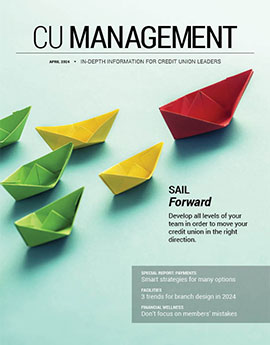3 minutes
Try these practical ways to develop your next team of leaders.
As you work to build the next level of leadership in your organization, include activities that exercise their thinking as part of a cross-organizational team. The typical focus on individual skills is important, but actually taking on organization-wide issues in a controlled manner can fast-track development. Asking your staff to work on real-world assignments as a team—almost as if they are the senior team—can:
- Inspire individuals to think outside of their silos
- Provide valuable learning opportunities for growth
- Free up senior leadership time for strategic thinking
If this feels uncomfortable, ask yourself, “How does the next level really get a chance to grow if they are not allowed to make decisions that could lead to mistakes?” Experiential learning provides firsthand experience and the chance to reflect on how things could be done differently or better the next time.
Start the team with above-the-water-line decisions that don’t have the potential to sink the organization. Decide ahead-of-time the types of mistakes you can accept for the sake of professional growth and learning experiences. Remember, you can learn during this process, too. It is not uncommon for this type of experiential learning to also result in growth for the current senior team.
Another approach is to ask your next level of leaders to work together to simulate what they would do for the tougher decisions the senior team regularly faces. This not only helps to accelerate professional development, it also can result in deeper thinking and better performance in their current roles. It is a win for the entire organization.
Following are some examples to consider in providing learning opportunities.
1. Which projects get resources and which projects go on hold?
c. myers corporation hasn’t seen an organization that has more talent to implement projects than the number of projects it has. Strategically allocating human and financial resources is at the top of the tough decisions list. Letting the next-level team struggle with this together can be fruitful on many levels.
2. Where should the new talent go?
In this example, the organization knows it needs an additional person. The question for the next-level team is how that resource should be used. Asking them to consider which area needs the resource the most, and whether responsibilities in other areas should be shifted, trains the team to look at the organization holistically and cooperatively. It may also reveal new ideas to address resource needs.
3. What goes into the budget?
Some areas of budgeting, such as funding strategic initiatives, are not up for discussion, but there are many competing budget requests for optional items that the next-level team could take on. Task them with reviewing and recommending which requests make it into the budget while staying within the overall budget. This requires the team to work collaboratively for the good of the entire organization and link their choices to the larger strategy.
As you begin building your team, don’t ask them to take on these activities when there is a time crunch—yet. As the team progresses, you can and should up the ante with stressors like time constraints and tougher decisions. Also, make it clear that decisions will be reviewed by senior leadership. This provides an opportunity to observe how they think on a larger stage and how they work together. Eventually, your reliance on them will grow, which ultimately builds bench strength and frees up senior leadership for more strategic pursuits.
So ask yourself, what experiential learning opportunities could your next-level team tackle?
For more on leadership development, also read "Leadership Matters: Orienting Mid-level Leaders to Strategy" and "From John: More Talent Development" on CUmanagement.com.
Leadership takes practice and practice makes perfect. Practice by running a virtual financial institution at CUES School of Applied Strategic Management™, May 6-9, 2019, in Orlando, FL. Become a CUES member or renew your membership for 2019 and receive the best CUES school and event pricing.









